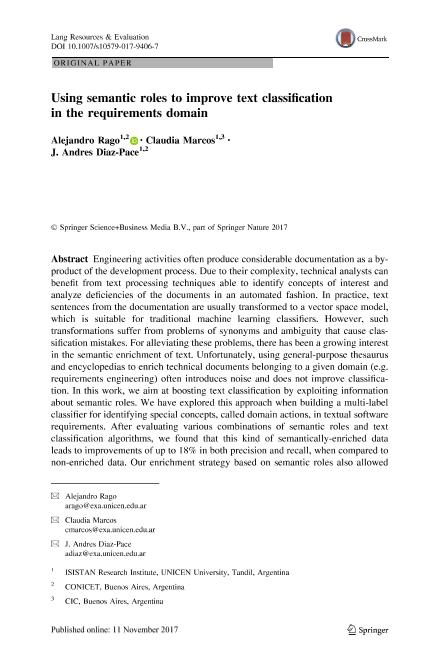Mostrar el registro sencillo del ítem
dc.contributor.author
Rago, Alejandro Miguel

dc.contributor.author
Marcos, Claudia Andrea

dc.contributor.author
Diaz Pace, Jorge Andres

dc.date.available
2018-09-05T18:33:36Z
dc.date.issued
2018-09
dc.identifier.citation
Rago, Alejandro Miguel; Marcos, Claudia Andrea; Diaz Pace, Jorge Andres; Using semantic roles to improve text classification in the requirements domain; Springer; Language Resources And Evaluation; 52; 3; 9-2018; 801-837
dc.identifier.issn
1574-020X
dc.identifier.uri
http://hdl.handle.net/11336/58395
dc.description.abstract
Engineering activities often produce considerable documentation as a by-product of the development process. Due to their complexity, technical analysts can benefit from text processing techniques able to identify concepts of interest and analyze deficiencies of the documents in an automated fashion. In practice, text sentences from the documentation are usually transformed to a vector space model, which is suitable for traditional machine learning classifiers. However, such transformations suffer from problems of synonyms and ambiguity that cause classification mistakes. For alleviating these problems, there has been a growing interest in the semantic enrichment of text. Unfortunately, using general-purpose thesaurus and encyclopedias to enrich technical documents belonging to a given domain (e.g. requirements engineering) often introduces noise and does not improve classification. In this work, we aim at boosting text classification by exploiting information about semantic roles. We have explored this approach when building a multi-label classifier for identifying special concepts, called domain actions, in textual software requirements. After evaluating various combinations of semantic roles and text classification algorithms, we found that this kind of semantically-enriched data leads to improvements of up to 18% in both precision and recall, when compared to non-enriched data. Our enrichment strategy based on semantic roles also allowed classifiers to reach acceptable accuracy levels with small training sets. Moreover, semantic roles outperformed Wikipedia- and WordNET-based enrichments, which failed to boost requirements classification with several techniques. These results drove the development of two requirements tools, which we successfully applied in the processing of textual use cases.
dc.format
application/pdf
dc.language.iso
eng
dc.publisher
Springer

dc.rights
info:eu-repo/semantics/openAccess
dc.rights.uri
https://creativecommons.org/licenses/by-nc-sa/2.5/ar/
dc.subject
Knowledge Representation
dc.subject
Natural Language Processing
dc.subject
Semantic Enrichment
dc.subject
Text Classification
dc.subject
Use Case Specification
dc.subject.classification
Ciencias de la Computación

dc.subject.classification
Ciencias de la Computación e Información

dc.subject.classification
CIENCIAS NATURALES Y EXACTAS

dc.title
Using semantic roles to improve text classification in the requirements domain
dc.type
info:eu-repo/semantics/article
dc.type
info:ar-repo/semantics/artículo
dc.type
info:eu-repo/semantics/publishedVersion
dc.date.updated
2018-09-05T16:23:16Z
dc.identifier.eissn
1574-0218
dc.journal.volume
52
dc.journal.number
3
dc.journal.pagination
801-837
dc.journal.pais
Alemania

dc.description.fil
Fil: Rago, Alejandro Miguel. Consejo Nacional de Investigaciones Científicas y Técnicas. Centro Científico Tecnológico Conicet - Tandil. Instituto Superior de Ingeniería del Software. Universidad Nacional del Centro de la Provincia de Buenos Aires. Instituto Superior de Ingeniería del Software; Argentina
dc.description.fil
Fil: Marcos, Claudia Andrea. Universidad Nacional del Centro de la Provincia de Buenos Aires. Facultad de Ciencias Exactas. Instituto de Sistemas Tandil; Argentina
dc.description.fil
Fil: Diaz Pace, Jorge Andres. Consejo Nacional de Investigaciones Científicas y Técnicas. Centro Científico Tecnológico Conicet - Tandil. Instituto Superior de Ingeniería del Software. Universidad Nacional del Centro de la Provincia de Buenos Aires. Instituto Superior de Ingeniería del Software; Argentina
dc.journal.title
Language Resources And Evaluation

dc.relation.alternativeid
info:eu-repo/semantics/altIdentifier/doi/http://dx.doi.org/10.1007/s10579-017-9406-7
dc.relation.alternativeid
info:eu-repo/semantics/altIdentifier/url/https://link.springer.com/article/10.1007%2Fs10579-017-9406-7
Archivos asociados
